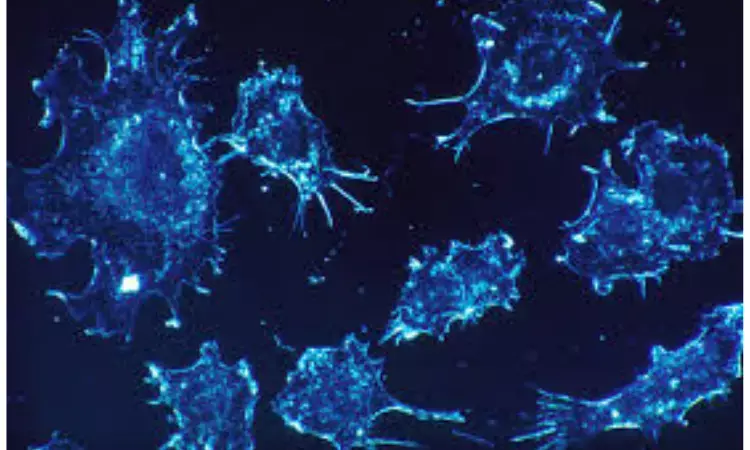- Home
- Medical news & Guidelines
- Anesthesiology
- Cardiology and CTVS
- Critical Care
- Dentistry
- Dermatology
- Diabetes and Endocrinology
- ENT
- Gastroenterology
- Medicine
- Nephrology
- Neurology
- Obstretics-Gynaecology
- Oncology
- Ophthalmology
- Orthopaedics
- Pediatrics-Neonatology
- Psychiatry
- Pulmonology
- Radiology
- Surgery
- Urology
- Laboratory Medicine
- Diet
- Nursing
- Paramedical
- Physiotherapy
- Health news
- Fact Check
- Bone Health Fact Check
- Brain Health Fact Check
- Cancer Related Fact Check
- Child Care Fact Check
- Dental and oral health fact check
- Diabetes and metabolic health fact check
- Diet and Nutrition Fact Check
- Eye and ENT Care Fact Check
- Fitness fact check
- Gut health fact check
- Heart health fact check
- Kidney health fact check
- Medical education fact check
- Men's health fact check
- Respiratory fact check
- Skin and hair care fact check
- Vaccine and Immunization fact check
- Women's health fact check
- AYUSH
- State News
- Andaman and Nicobar Islands
- Andhra Pradesh
- Arunachal Pradesh
- Assam
- Bihar
- Chandigarh
- Chattisgarh
- Dadra and Nagar Haveli
- Daman and Diu
- Delhi
- Goa
- Gujarat
- Haryana
- Himachal Pradesh
- Jammu & Kashmir
- Jharkhand
- Karnataka
- Kerala
- Ladakh
- Lakshadweep
- Madhya Pradesh
- Maharashtra
- Manipur
- Meghalaya
- Mizoram
- Nagaland
- Odisha
- Puducherry
- Punjab
- Rajasthan
- Sikkim
- Tamil Nadu
- Telangana
- Tripura
- Uttar Pradesh
- Uttrakhand
- West Bengal
- Medical Education
- Industry
Cancer preventing action of Statins may slow down metastases

Cancer patients rarely die from the primary tumor but rather from the metastases - even after successful tumor surgery. This is because cancer cells sometimes spread to other parts of body early in the disease, when the tumor is still very small and may not have even been discovered yet. To do this they must break away from the extracellular matrix and migrate into neighboring lymphatic vessels or blood vessels that transport them to new tissue, where they settle and proliferate.
Understanding the molecular mechanisms of metastasis is therefore a key piece of the puzzle in the fight against cancer. More than ten years ago, Professor Ulrike Stein and her lab at the Experimental and Clinical Research Center (ECRC) were able to discover an important driver of this process in human colorectal cancer: the metastasis-associated in colon cancer 1 (MACC1) gene.
When cancer cells express MACC1, their ability to proliferate, move around the body, and invade other tissues is enhanced. "Many types of cancers spread only in patients with high MACC1 expression," Stein explains. MACC1's role as a key factor and biomarker of tumor growth and metastasis – not only in colorectal cancer, but in more than 20 solid tumors such as gastric, liver and breast cancer – has since been studied by many other researchers worldwide and confirmed in more than 300 publications. Now together with Dr. Robert Preißner of Charité, Stein has discovered what could disrupt metastatic progression in such cases: Statins, which are prescribed as cholesterol-lowering drugs, inhibit MACC1 expression in tumor cells. The scientists are presenting their findings in the journal Clinical and Translational Medicine.
In their search for MACC1 inhibitors, the researchers conducted high-throughput drug screening with colleagues at the European Molecular Biology Laboratory (EMBL) in Heidelberg, Germany. They independently hit upon statins. They tested this discovery on various tumor cell lines, with favorable results: All seven drugs tested reduced MACC1 expression in the cells but to varying degrees. The scientists then administered the cholesterol inhibitors to genetically modified mice with increased MACC1 expression. This almost completely suppressed the formation of tumors and metastases in the animals. "What is particularly remarkable is that the benefits continued in the animals even after we reduced the dose relative to the amount that humans normally ingest," Stein says.
Statins have one big advantage: they are already approved
Robert Preißner and scientists at the University of Virginia also examined data from a total of 300,000 patients who had been prescribed statins. This analysis found a correlation: "Patients taking statins had only half the incidence of cancer compared to the general population," Preißner explains.
Stein advises against taking statins as a preventive measure without consulting a doctor and having their lipid levels checked, so as to ensure no serious side effects occur. "We are still at the very beginning," the scientist stresses. "Cell lines and mice are not human beings, so we cannot directly transfer the results." The experimental studies and retrospective data analysis will now be followed up by a clinical trial, she says. Only after that will it be possible to say with certainty whether statins actually prevent or reduce metastasis in patients with high MACC1 expression.
https://onlinelibrary.wiley.com/doi/10.1002/ctm2.726
Hina Zahid Joined Medical Dialogue in 2017 with a passion to work as a Reporter. She coordinates with various national and international journals and association and covers all the stories related to Medical guidelines, Medical Journals, rare medical surgeries as well as all the updates in the medical field. Email: editorial@medicaldialogues.in. Contact no. 011-43720751
Dr Kamal Kant Kohli-MBBS, DTCD- a chest specialist with more than 30 years of practice and a flair for writing clinical articles, Dr Kamal Kant Kohli joined Medical Dialogues as a Chief Editor of Medical News. Besides writing articles, as an editor, he proofreads and verifies all the medical content published on Medical Dialogues including those coming from journals, studies,medical conferences,guidelines etc. Email: drkohli@medicaldialogues.in. Contact no. 011-43720751


